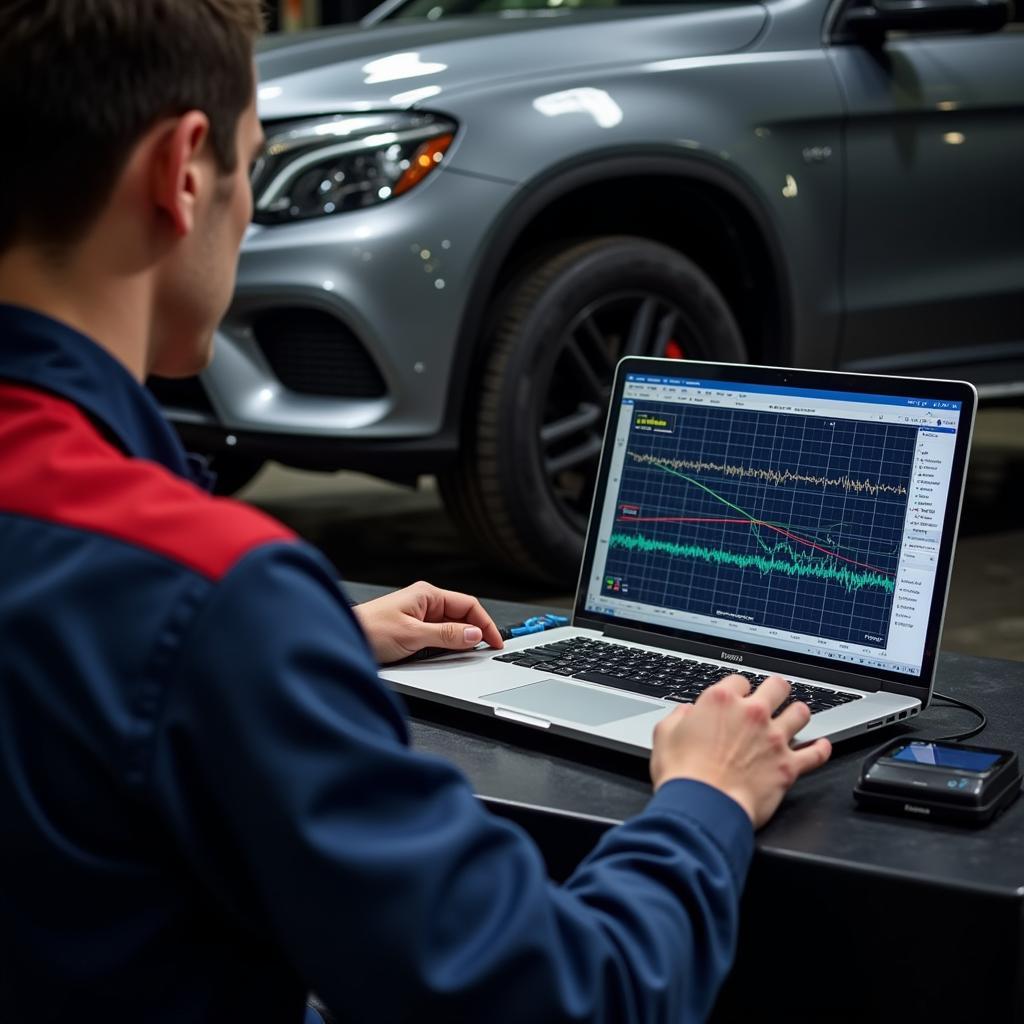Car diagnostics definition refers to the process of identifying issues within a vehicle’s various systems using specialized equipment and software. This technology has revolutionized the automotive repair industry, enabling mechanics to pinpoint problems with greater accuracy and efficiency than ever before. From engine performance to transmission glitches, car diagnostics play a vital role in keeping vehicles running smoothly and safely. If you’re looking to understand this essential aspect of car maintenance, this guide will delve into the intricacies of car diagnostics, exploring its benefits, applications, and the technology behind it. You can find a reliable car diagnostic tool near you through our resource car diagnostic near me.
Understanding the Car Diagnostics Definition
At its core, car diagnostics involves retrieving data from a vehicle’s onboard computer, known as the Engine Control Unit (ECU) or Powertrain Control Module (PCM). This data provides valuable insights into the performance of various systems, including the engine, transmission, brakes, and emissions control. By analyzing these digital clues, mechanics can quickly identify the root cause of a problem, saving time and avoiding unnecessary repairs. Modern car diagnostics tools offer a wealth of information, going far beyond simply reading error codes. They can provide real-time data on sensor readings, fuel efficiency, and even driver behavior.
Why is Car Diagnostics Important?
Car diagnostics is a crucial part of preventative maintenance, helping identify potential problems before they escalate into major repairs. Regular diagnostics can also improve fuel efficiency and reduce emissions, contributing to a greener environment. Furthermore, accurate diagnostics ensures the safety of both the driver and passengers by addressing potential malfunctions promptly.
The Evolution of Car Diagnostics
The earliest forms of car diagnostics involved rudimentary methods like checking spark plugs and listening to engine noises. However, the introduction of onboard computers in the 1980s revolutionized the process. Early diagnostic tools were simple code readers, providing limited information. Today, advanced diagnostic scanners offer comprehensive data analysis, enabling mechanics to access a wealth of information at their fingertips. This progression has led to quicker repairs, more accurate diagnoses, and improved overall vehicle performance.
Types of Car Diagnostic Tools
Several car diagnostic tools cater to different needs and levels of expertise. Basic OBD-II scanners are readily available for car owners to perform basic checks. Professional-grade scan tools offer more advanced functionalities, including live data streaming, bi-directional control, and access to manufacturer-specific data. Looking for a good diagnostic tool? Check out our best car diagnostic tool review.
Decoding the Diagnostic Trouble Codes (DTCs)
Diagnostic Trouble Codes (DTCs) are alphanumeric codes that indicate specific malfunctions detected by the vehicle’s computer. Each code corresponds to a particular issue, providing a starting point for the diagnostic process. Understanding these codes is essential for effective troubleshooting. While generic codes apply to most vehicles, manufacturer-specific codes delve into more detailed diagnostics for individual car makes and models. A reliable car diagnostic machine is a worthy investment. You can find options for sale in South Africa on our page car diagnostic machine for sale in south africa.
How Car Diagnostics Works
The diagnostic process begins by connecting a scan tool to the vehicle’s OBD-II port. The scan tool then retrieves DTCs stored in the ECU. Mechanics use these codes, combined with their knowledge and experience, to pinpoint the root cause of the problem. Live data streaming allows mechanics to monitor sensor readings in real time, providing further insights into the issue.
 Mechanic Analyzing Diagnostic Data on a Laptop
Mechanic Analyzing Diagnostic Data on a Laptop
The Future of Car Diagnostics
With the advent of electric vehicles and autonomous driving, car diagnostics is poised for further transformation. The increasing complexity of vehicle systems demands more sophisticated diagnostic tools and techniques. Remote diagnostics and predictive analytics are gaining traction, enabling proactive maintenance and minimizing downtime. “The future of car repair relies heavily on accurate and efficient diagnostics,” says John Smith, Lead Automotive Engineer at Advanced Auto Solutions. “This technology allows us to provide proactive solutions, ensuring vehicle safety and optimal performance.”
Benefits of Regular Car Diagnostics
Regular car diagnostics offers a range of benefits, from improved fuel economy and reduced emissions to enhanced safety and extended vehicle lifespan. Early detection of problems can prevent costly repairs down the line. Proactive maintenance through diagnostics also minimizes the risk of unexpected breakdowns, ensuring peace of mind for drivers. Looking for a specific car diagnostic tool? Check out our page on car diagnostic tool co za.
Conclusion
Car diagnostics definition encompasses a vital process that ensures vehicle health, safety, and performance. From simple code readers to advanced scan tools, this technology plays a critical role in the automotive repair industry. Regular diagnostics is an investment in the longevity and reliability of your vehicle, saving you time and money in the long run. “Investing in regular diagnostics is not just about fixing problems; it’s about preventing them,” adds Jane Doe, Senior Mechanic at AutoTech Solutions. “This proactive approach ensures the safety and reliability of your vehicle for years to come.” Remember, understanding the car diagnostics definition and its importance is key to maintaining your vehicle in optimal condition. The p wow wifi car diagnostic south africa is a great example of available tools.
FAQ
-
What is OBD-II? OBD-II stands for On-Board Diagnostics, Generation Two, and it is a standardized system for accessing vehicle diagnostic information.
-
How often should I get car diagnostics done? It’s recommended to have your car diagnosed at least once a year or as part of your regular maintenance schedule.
-
Can I perform car diagnostics myself? Basic OBD-II scanners are available for DIY diagnostics, but complex issues require professional expertise.
-
What is a DTC? A DTC, or Diagnostic Trouble Code, is a code that indicates a specific malfunction detected by the vehicle’s computer.
-
How much does car diagnostics cost? The cost of car diagnostics can vary depending on the complexity of the issue and the location of the repair shop.
-
What are the benefits of regular car diagnostics? Regular diagnostics can improve fuel efficiency, reduce emissions, enhance safety, and extend vehicle lifespan.
-
What is the future of car diagnostics? The future of car diagnostics involves more sophisticated tools, remote diagnostics, and predictive analytics.
Common Car Diagnostic Scenarios
- Check Engine Light: This is the most common trigger for car diagnostics.
- Poor Fuel Economy: Diagnostics can pinpoint issues affecting fuel efficiency.
- Unusual Noises or Vibrations: Diagnostic tools can identify the source of these problems.
- Transmission Problems: Diagnostics can help diagnose transmission malfunctions.
- Brake Issues: Diagnostic scans can detect problems with the braking system.
Further Reading
For more information, explore other articles on our website related to car maintenance and repair tips. We offer a wealth of resources to help you keep your car in top condition.
Need assistance? Contact us via WhatsApp: +1(641)206-8880, Email: [email protected]. Our customer service team is available 24/7.


